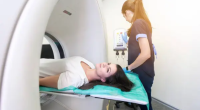Doctors Perplexed as Man’s Colonoscopy Reveals Live Fly – During a routine colonoscopy, doctors were baffled to discover a fully intact fly residing within the large intestine of a 63-year-old Missouri man. This perplexing finding is documented in the American Journal of Gastroenterology.
The patient, who underwent the colonoscopy as a standard screening procedure for colorectal cancer, remained asymptomatic throughout the ordeal, unaware of the fly’s presence. The fly, found in the transverse colon, showed no signs of movement when examined by the colonoscope.
The patient’s recollection of his meals leading up to the procedure revealed no obvious entry point for the insect. He had consumed only clear liquids, as instructed by the colonoscopy preparation guidelines. The patient’s last solid meal, consisting of pizza and lettuce, two days prior to the procedure, also yielded no clues.
Dr. Matthew Bechtold, the chief of Gastroenterology at the University of Missouri, expressed his puzzlement regarding the fly’s route into the patient’s intestines. “The insect has unlikely entered through the patient’s mouth, as upper digestive enzymes and stomach acid would have degraded it,” he stated to The Independent. The possibility of the fly entering from the rectum was also deemed improbable due to the anatomical complexities involved.
The study acknowledges the existence of rare instances where insects have remained intact during their passage through the digestive system. One potential explanation is intestinal myiasis, a condition caused by the infestation of fly larvae that feed on dead or living tissue or ingested food. This condition, according to the Centers for Disease Control and Prevention, typically occurs when fly eggs or larvae are consumed and survive the harsh environment of the gastrointestinal tract.
While some individuals with intestinal myiasis exhibit no symptoms, others may experience abdominal pain, vomiting, and diarrhea. Myiasis can also affect other anatomical sites beyond the intestines, including the skin, eyes, ears, and wounds.
Conclusion
The study highlights the rarity of this particular colonoscopic finding, leaving the mystery of the fly’s entry into the patient’s intestines unsolved.
Despite the unusual encounter with the fly, colonoscopies remain a crucial screening tool for detecting irritated and swollen tissue, ulcers, polyps, and colorectal cancer. The National Institute of Diabetes and Digestive and Kidney Diseases emphasizes the importance of colonoscopies in early cancer detection, especially for individuals experiencing symptoms such as bleeding from the anus, changes in bowel movements, abdominal pain, and unexplained weight loss.
Routine colonoscopies are recommended for people aged 45 and older, as well as those with an elevated risk of developing colorectal cancer. Risk factors for colorectal cancer include:
- Black racial or ethnic background
- Personal or family history of colorectal cancer
- Personal history of ovarian cancer, polyps, or inflammatory bowel disease
- Lynch syndrome, a genetic disorder that increases the risk of colorectal cancer
- Obesity, smoking, or alcohol consumption
Since colorectal cancer seldom manifests symptoms before it has progressed or spread, regular screening is essential for early detection and successful treatment.
Continue to check our website soundhealthandlastingwealth.com for more articles of this kind. And, please use our comment section as well, we would love to hear from you.








